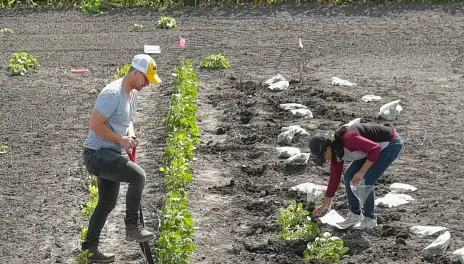Nitrogen-producing Bacteria Reduce Dependence on Fertilizer
Microbes play a big role in agriculture. The bacteria present in the soil, plants and animals can impact factors such as yield, profitability and sustainability of agriculture. Recognizing the importance of microbiome research for North Dakota farmers, NDSU Microbiological Sciences launched an agribiome initiative to study various ways bacteria impact farming and ranching.
“North Dakota farmers are feeding the world, and we are trying to help them do that as productively and sustainably as possible,” says Barney Geddes, assistant professor of microbiological sciences.
Geddes researches a specific group of nitrogen-producing bacteria called rhizobia. Rhizobia form a tight symbiotic relationship with legume plants, including soybeans, peas, dry beans and alfalfa. The roots of legumes form nodules to house the bacteria, and the bacteria take nitrogen from the air and supply it to the legume.
While chemical nitrogen fertilizer is a proven method of increasing crop yield, it is often the biggest input cost for farmers. Finding alternative methods of delivering nitrogen to crops can create significant cost savings for farmers and also have a beneficial impact on soil health and the environment.
The Geddes lab is working with North Dakota farmers to optimize rhizobium use in agriculture and develop precision agriculture tools to monitor their populations in North Dakota soils. As their work progresses, they hope to improve the technology that farmers have access to and develop a deeper understanding of which strains create the best results in North Dakota. In the long term, they will look at engineering a symbiotic relationship with cereal crops such as corn, wheat and barley.
“Microbes are the next revolution in agriculture,” says Geddes. “It’s crucial that, as a leader in agriculture, NDSU participates in this research to ensure North Dakota farmers are benefiting from the latest developments.”
MORE INFORMATION:
Barney Geddes, 701-231-7692, barney.geddes@ndsu.edu

